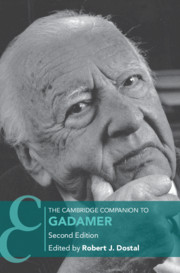Book contents
- The Cambridge Companion to Gadamer
- Other Volumes in the Series of Cambridge Companions
- The Cambridge Companion to Gadamer
- Copyright page
- Contents
- Contributors
- Abbreviations
- Introduction
- 1 Gadamer (1900–2002)
- 2 Gadamer’s Basic Understanding of Understanding
- 3 Getting It Right
- 4 Philosophical Hermeneutics, Language, and the Communicative Event
- 5 Phronesis and Solidarity
- 6 Gadamer’s Herderian Critics
- 7 Gadamer on the Human Sciences
- 8 Art Experience and Its Transformative Potential in Gadamer’s Hermeneutics
- 9 Lyric as Paradigm
- 10 Gadamer, the Hermeneutic Revolution, and Theology
- 11 Hermeneutics in Practice
- 12 Gadamer’s Hegel
- 13 Gadamer’s Relation to Heidegger and to Phenomenology
- 14 The Constellation of Hermeneutics, Critical Theory, and Deconstruction
- 15 Hermeneutics in a Broader Horizon
- Bibliography
- Index
- Other Volumes in the Series of Cambridge Companions (continued from page ii)
12 - Gadamer’s Hegel
Published online by Cambridge University Press: 29 July 2021
- The Cambridge Companion to Gadamer
- Other Volumes in the Series of Cambridge Companions
- The Cambridge Companion to Gadamer
- Copyright page
- Contents
- Contributors
- Abbreviations
- Introduction
- 1 Gadamer (1900–2002)
- 2 Gadamer’s Basic Understanding of Understanding
- 3 Getting It Right
- 4 Philosophical Hermeneutics, Language, and the Communicative Event
- 5 Phronesis and Solidarity
- 6 Gadamer’s Herderian Critics
- 7 Gadamer on the Human Sciences
- 8 Art Experience and Its Transformative Potential in Gadamer’s Hermeneutics
- 9 Lyric as Paradigm
- 10 Gadamer, the Hermeneutic Revolution, and Theology
- 11 Hermeneutics in Practice
- 12 Gadamer’s Hegel
- 13 Gadamer’s Relation to Heidegger and to Phenomenology
- 14 The Constellation of Hermeneutics, Critical Theory, and Deconstruction
- 15 Hermeneutics in a Broader Horizon
- Bibliography
- Index
- Other Volumes in the Series of Cambridge Companions (continued from page ii)
Summary
This chapter explores what Gadamer might mean by giving hermeneutics the task of “overcoming the primacy of self-consciousness” and asks whether it is really Hegel in his sights as he attempts to do so. The chapter first attends to the conflicting strands of deep solidarity with Hegel, coupled with just as deep a rejection. Gadamer’s final answer is that Hegel’s philosophy, whatever Hegel may have intended, did not completely break free of “subjectivism.” Of fundamental importance for Gadamer is the idea of finitude. Gadamer embraces what Hegel calls “the bad infinite” when he claims that the “soul’s dialogue with itself” has no teleological end point and is inexhaustible. Gadamer points to the limits of reflection.
- Type
- Chapter
- Information
- The Cambridge Companion to Gadamer , pp. 309 - 333Publisher: Cambridge University PressPrint publication year: 2021

